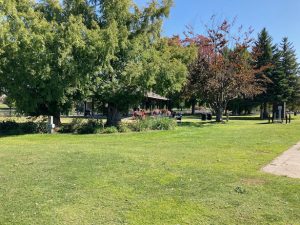Our most recent MCHS picnic took place on July 26, 2023 in Stratford, Ontario
We had an enjoyable high school get together, with lots of interesting conversations and great food, on a pleasant summer day in Stratford, Ontario, on Wednesday, July 26, 2023. We had previously met in Stratford on September 30, 2020.
Each of us (there were eight of us) brought their own picnic lunch and we also had great treats – cookies, cupcakes, brownies – to share. Our picnics have been regular events in recent years. Before the picnics, we used to meet indoors for lunch, but things got changed after COVID-19 appeared on the scene.
Our previous Malcolm Campbell High School picnic before this one was at Lynn and Mike Legge’s house in London. Our next picnic is set for Tuesday, August 29, 2023 in Toronto, and we’re also planning a picnic in September or October in Woodstock. Our picnics are open to all MCHS grads and staff (no matter what year you were there) and their families and friends. Please contact me at jpill@preservedstories.com if you wish to be on our picnic email list. If MCHS grads are travelling from elsewhere in the world, such as on vacation, and their schedule can manage it, they would be most welcome to join us for a picnic.

Our first MCHS picnic in Woodstock took place on Aug. 20, 2020 at Southside Park. Our third Woodstock event is planned for September or October 2023. Jaan Pill photo
1950s and 1960s Studebakers
For the July 26 picnic we met on the front porch of a house near the Festival Theatre in Stratford. It was a hot day but cool in the shade. We had been concerned about what the Air Quality Index would be on this day, as the air pollution level had been very high earlier in the summer, the result of smoke from forest fires in Quebec, but the air quality turned out to be fine.
We met on a front porch where the arrangement of furniture meant that we were not able, on this particular occasion, to sit as one large group. For a future event in Stratford, we can ensure that we meet as one conversational group, as has been the case in previous years such as when we used to meet at Mandarin restaurants (in Kitchener and Toronto) during the pre-COVID era. I mention this by way of noting that on this occasion there were some conversations that I would have missed.
In one of our discussions, Dan Cayer spoke about a Studebaker that he owned many years ago. His comments reminded me of a 1951 Studebaker that I saw at a car show in Stratford on June 18, 2023. The classic car in question, based on my online research, was a 1951 Studebaker Champion 4 Door Sedan. If I recall correctly, Dan said that his 1960s-era Studebaker had featured a huge, powerful engine at the front; there wasn’t much weight at the back – and as a consequence, the handling on the corners wasn’t awesome.
Celebration of life event for Ron Spearman
In news updates, of which we had many, I was pleased to learn from Zenon Levitzky that the celebration of life event, for his son-in-law Ron Spearman, who had passed away on May 17, 2023, had been a significant and memorable occasion for all who attended. Ron had a deep connection, built up over many years, to his local community; this connection was readily evident, as Zenon mentioned, in the memories shared at the celebration of life event.
Zucchini recipes
This year we have a lot of zucchinis growing in our backyard garden in Stratford. We are looking forward to some recipes that regular MCHS picnic attendees, Gina Cayer and Lynn Legge, are sending to help us figure out how best to prepare some great garden-to-table zucchini dishes. My wife May Jolliffe and I are always keen to learn about such recipes.
In other news updates, we also spoke about pickleball and summertime boating pursuits on the Great Lakes. Many opportunities for summertime recreation are available for us in Southwestern Ontario, where quite a good number of MCHS grads now live since leaving Montreal.
Books MCHS grads are currently reading
At the picnic, Scott Munro mentioned a book by Jared Yates Sexton he’s been reading – The Midnight Kingdom: A History of Power, Paranoia and the Coming Crisis (2023). As Scott has noted, the author goes from Roman times to current times on this one. Also interesting for Scott was a book by Mary L. Trump – The Reckoning: Our Nation’s Trauma and Finding a Way to Heal (2021). Scott has commented, “Anyone who thinks that America must be over the Civil War by now might think again after reading this.” At the links in this paragraph you can find blurbs and reviews, at the Toronto Public Library website, for these books.
We also spoke about 21 Things You May Not Know About the Indian Act: Helping Canadians Make Reconciliation with Indigenous Peoples a Reality (2018) by Robert P. C Joseph. An excerpt (Chapter 3, Tightening Control, p. 53), regarding the origin story of the residential schools system, reads:
The goal of the schools was to “kill the Indian in the child,” but tragically it was the children themselves who died in overwhelming numbers at these schools. It is estimated that 6,000 of the 150,000 children who attended the schools between the 1870s and 1996 either died or disappeared. The numbers are not precise because no one kept accurate records: not the schools, the churches that managed the schools, or the Indian agents. Children died at the schools from disease, malnourishment, and broken hearts. Many children who escaped from their residential school died on the journey to their home community.
Political history of Saskatchewan
Among many other topics of interest, we talked about many aspects of history. I have, with regard to Canadian history, wondered for many years about what accounts for certain features of political development in the province of Saskatchewan.
At the picnic I mentioned that I’ve recently come across a book by Dale Eisler – From Left to Right: Saskatchewan’s Political and Economic Transformation (2022) – that has been helpful, in enhancing my understanding of the history of the Prairie provinces. A sentiment, strongly underlined in the book, is that the oil and gas industry continues to have a very strong level of support in Alberta and Saskatchewan. As I understand, this continues to be the case, even a year after the book was published.
The support appears to continue to be strong, even in the face of record-breaking heatwaves and increasingly frequent and destructive forest fires. The book highlights public opinion research which documents that the scientific evidence, which underlines that climate change is the direct result of carbon emissions resulting from human activity, is accepted by a significantly smaller segment of citizens of Alberta and Saskatchewan – especially among rural residents – than elsewhere across Canada.

1951 Studebaker Champion 4 Door Sedan on display at car show along Avon River in Stratford, June 18, 2023. Jaan Pill photo
A Short History of Canada (2001, 2017)
We spoke as well about A Short History of Canada, Fifth Edition (2001) by Desmond Morton. (I refer to the fifth edition – a seventh edition, published in 2017, is also available.) After the picnic, I borrowed the fifth edition from the Stratford Public Library. I was interested to compare how this book addresses the history of the Hudson’s Bay Company. I would describe the approach as anodyne – not likely to provoke dissent or offence. In a sense, it’s a book that keeps a person’s connection with history at a certain emotional distance. It’s a form of official-sounding history, in my view, which presents the past, for a general reading audience, as akin to a grocery list of facts: the connection to one’s everyday life may be largely absent. John Vaillant, in contrast, in Fire Weather: The Making of a Beast (2023), describes the history of the Hudson’s Bay Company in decidedly more acerbic terms – he notes (p. 33) that the fur trade
shaped Canada’s creation myth and set the tone for how extractive industries continue to operate there. Through this lens, Canada in general, and Alberta in particular, could be seen not as a “state in the guise of a merchant,” but as a merchant in the guise of a state. This colonial model, which systematically commodifies natural resources and binds local people to the trading post system with company store-style debt, has replicated itself in resource towns across the continent.
I would argue that The Short History of Canada (2001) is an anodynic – that is, in the way of an anodyne, relating to relief from pain – account of national history, of the kind that you can expect from a widely read historian based in Toronto. It is a voice that is widely adopted, when a person writes about history for a general audience. By way of contrast, I would argue that Fire Weather (2023) is the kind of suitably acerbic – that is, sharp and forthright – commentary that you can expect from a best-selling author from Western Canada.
The voice that Dale Eisler adopts in From Left to Right (2022) also manages to present a voice which, again, is more than a grocery list of facts. In the latter case, the voice is of a nature which underlines that history entails a configuration of forces – the comprehension of which requires a certain sense of nuance, a sense that there are several kinds of histories that a person can choose from, when describing a certain period or episode from years gone by.
Ubiquity of vintage car shows
I shared an earlier version of the current post with the MCHS lunches email list that we’ve had in place for several years. In response, a member of the list commented, “It must be the season for car shows.”
The comment prompted me to think about what a great purpose such classic car shows serve. They bring people together; they operate as a form of heritage preservation – on wheels. Many of the owners of such cars are in their seventies and eighties. Props (such as 1960s-era cars) from the past may be literally a way to help a person keep in good shape mentally and physically, judging from research by the social psychologist Ellen Langer among others. I’ve highlighted this feature of productively reliving the past in a post about Langer’s work:
Mindfulness stands in contrast to mindlessness
An excerpt from the post reads:
An Oct. 22, 2014 New York Times article is entitled: “What if age is nothing but a mind-set?”
The article describes an experiment in which a group of subjects in their senior years, who had graduated from high school many decades earlier, were provided an intensive array of sensory cues – such as music from the 1950s, among many other cues – that enabled them to experience their “younger selves” from their high school years, over a period of five days.
They were instructed to imagine that they were in their teens once again. All manner of suitable artifacts – vintage radio, black-and-white TV – were provided to help them to experience themselves as their younger selves.
The resulting mind/body effects – people sat taller, their sight improved, and their minds appeared sharper – that are described in the article are of interest.
It may be argued – as a member of our email list has noted – that our high school picnics (which can also be characterized as mini-reunions) may serve a similar purpose to vintage car shows taking place everywhere.
Click here for music compiled for the MCHS 2025 Sixties Reunion >






News updates regarding next steps for Alberta’s oil and gas industry in the context of climate change include a July 29, 2023 CBC article entitled: “Danielle Smith calls on ‘reasonable’ ministers to counter Guilbeault’s influence in cabinet.”
An excerpt reads:
While Guilbeault has faced opposition at home over the government’s climate change agenda, he’s also run into resistance abroad. G20 environment ministers meeting in India recently were unable to reach a deal to put an end to unabated fossil fuel projects.
“Now I will be clear — our fight to keep 1.5 degrees alive continues. But we need to continue working to build consensus on the phase-out of unabated fossil fuels, which we didn’t quite get here,” Guilbeault told reporters.
“The fact that we couldn’t agree here at the G20 is not the end. We will continue.”
From Left to Right (2022) includes a reference to the “Iron Law of Oligarchy” which I found of much interest to read about. A good overview of the concept, as Dale Eisler notes, is presented in a comprehensive article by Darcy K. Leach, which is accessible at ResearchGate:
Oligarchy, Iron Law of
December 2015
DOI: 10.1016/B978-0-08-097086-8.93083-6
In book: International Encyclopedia of The Social and Behavioral Sciences Edition: 2nd Chapter: Oligarchy, Iron Law of Publisher: Elsevier Ltd.
The basic concept is very simple. Community-based initiatives of all kinds – including, but not restricted to, political and social movements – may arise on the basis of the intensive input of grassroots community members. Once such initiatives lead to the setting up of resulting power structures, however, power tends to shift from the grassroots to a small group that ends up running the show.
In volunteer work of years past, with a focus on community self-organizing, I’ve been aware of this phenomenon from the outset. I’ve learned that among the ways to short-circuit such a process of the concentration of power, within volunteer associations, is to work with others – from the very outset – to establish a strong culture of leadership succession for any such organization. The maintenance of an ongoing close and meaningful relationship – through regular consultations, meetings, surveys, and the like – between the leadership and the grassroots is also a key element.
The above-noted article by Darcy K. Leach provides a great overview of the power dynamics which are at play, in the creation of the concentration of power within organizations of various kinds – and with regard to the creation of effective and productive ways and means to prevent such a concentration of power.
An Encyclopedia Britannica article offers an additional overview of this interesting concept:
History & Society
iron law of oligarchy
sociological thesis
I have comments on several of these items. Before I start, I have lived in the US since 1980 and have worked on engineering projects in several southern states. Also, since 2009, I have been actively working on potash solution mining projects in Saskatchewan.
In 1982, Downers Grove, Illinois, where I lived at the time, celebrated its 150th Anniversary. One of the churches presented a series of vignettes about the Village’s history that emphasized its importance as a stop on the Underground Railway. About the same time (1982-83), I was working on a tunneling project in northern Georgia where the tunnel inspectors who were African-American had crosses burned on the lawns of their houses…To Southerners, the Civil War is known as the War of Northern Aggression, which is related to the sanitized version of US history of the Ante-Bellum and Civil War period that is portrayed in the movies — Birth of a Nation and Gone with the Wind — and promoted by DeSantis in Florida. The education standards of Public School systems in the Southern States would be laughable if it weren’t for the low literacy rate they produce. Bryan Cohen’s statement in 1966 that first year at University of Georgia was equivalent to Montreal Grade 9 is still fairly true…Jim Crow laws restricting African-Americans didn’t legally end until the Civil Rights Act of 1965, which many Republican states are trying to reverse.
With regard to oil and gas in Alberta and Saskatchewan, it is a major source of employment in both provinces and pays well. It’s within the last 10 years that restaurants in Edmonton and Calgary couldn’t get wait staff because unskilled workers could earn significantly more money working as janitors in Fort McMurray. In southeast Saskatchewan near Estevan, oil and gas operations and coal mines are the primary employers.
We had a 1947 4-door Studebaker from 1953 to 1956 but I don’t remember it having suicide doors (rear doors that opened at the front) like the one pictured. The ’37 Plymouth we had before the Stude definitely had them so I would remember if the Stude had them. Stude’s were known for the amount of engine oil they leaked and the steering on our ’47 was loosey goosey…
Wonderful to read the comments. In my experience, the MCHS picnics (as with the comments section of this website) have the elements of a seminar or symposium. I always find it of much interest to hear about the perspectives and experiences of fellow MCHS grads (and their family and friends) these many years later.
I often say to myself, “I know about my own experiences in life – and it’s also tremendously valuable to know of the life experiences of other people: it really adds to what I know; there is immense value in comparing notes.”
Your description of events and happenings the American South enables me to gain a much better understanding (from reading your comments) adds a sense of depth and texture to what I have picked up over the years from reading news and history accounts about that part of the world. Your comments add much to my comprehension of what is currently in play in states such as Florida.
I’ve recently been reading work by Robert A. Caro, the biographer of Robert Moses and Lyndon Baines Johnson. Caro has published four volumes so far about LBJ. The volume I’m currently reading is Means of Ascent (1990) which among other things provides vivid descriptions of Texas conditions and personalities – and, indeed, provides a detailed, evocative, well-documented account of Senate election-stealing in Texas (with LBJ as the central character) in the 1940s. A tremendously fine investigative journalist.
As well, I’ve read Working (2019) by the same author. Again, the vignettes about Texas and about people that Caro got to know in the course of his persistent pursuit of interviews for his research are utterly fascinating.
I was interested in your reference to the Saskatchewan potash industry, a topic which Dale Eisler speaks about at length and with clarity in From Left to Right (2022). Among other things, I’ve been interested to learn how much the oil and gas industry, and the potash industry, in tied in with the world economy.
In volunteer work at the national level many years back, I worked collaboratively with many capable individuals from Manitoba, Saskatchewan, and Alberta. I was really pleased to get to know them – very capable, highly resourceful individuals. In years past, I also spent quite a bit of time in Alberta and got to know the province quite well. No question, the oil and gas industry has been and remains a huge element in all aspects of cultural and economic life in that province. I’m reading several books which deal with the history and potential next steps for Alberta.
I had not noticed that the doors were facing forward on the 1951 Studebaker. Now I know. There was also a coupe version of the 1951 model, as I learned from an internet search. In that case, the back doors were missing entirely. For the recent blog post about the July 26, 2023 picnic, I originally included a description of the great handling that 1960s sports car that I drove along winding mountain roads in B.C. in those years but I deleted the item because there was other material that was even more important to fit into place.
John Vaillant’s overview of the legacy of the Hudson’s Bay Company brings to mind a book review by Caroline Elkins in the September/October 2023 issue of Foreign Affairs; an excerpt reads:
Philip Stern’s landmark book, Empire, Incorporated: The Corporations That Built British Colonialism [2023], resists facile comparisons between today’s multinational corporate giants and the chartered companies of yesteryear. It traces the evolution over four centuries of the British Empire’s joint-stock corporations, the East India Company among them, and their role in the state’s imperial designs, what Stern calls “corporate colonial ism.” Urging his readers to reflect “on the present quandaries of public and private power more through genealogy than analogy,” Stern painstakingly demonstrates how joint-stock “venture colonialism” financed and shaped the British Empire, forging legacies that endure to the present day.
Elkins is the author of Legacies of Violence: A History of the British Empire (2022).
Click here for previous posts featuring Caroline Elkins >